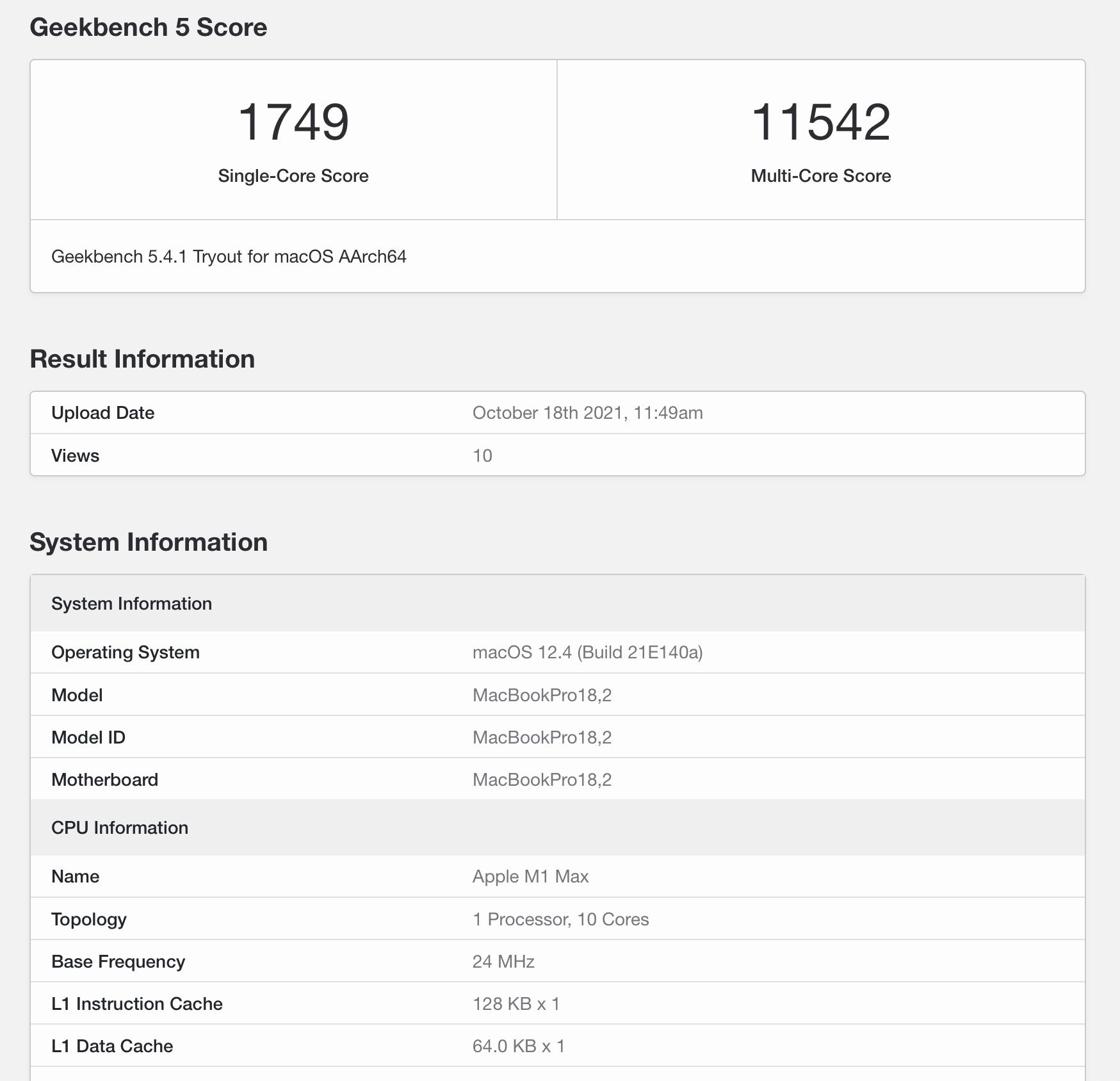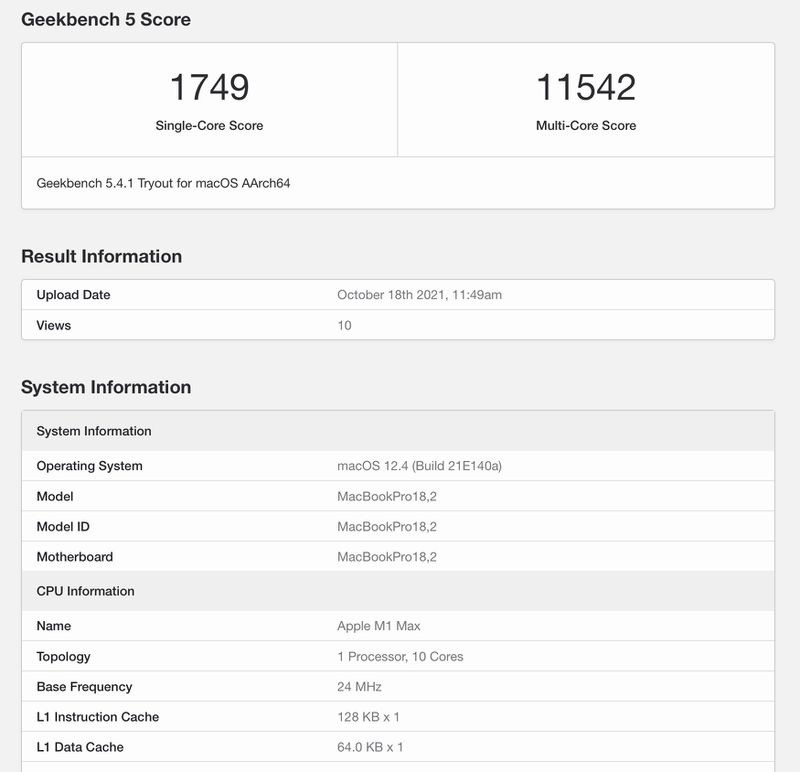Presumably they're looking at the die shots from the event.Where is the cache size reported? I missed that…
Got a tip for us?
Let us know
Become a MacRumors Supporter for $50/year with no ads, ability to filter front page stories, and private forums.
New cores (A15)
- Thread starter cmaier
- Start date
- Sort by reaction score
You are using an out of date browser. It may not display this or other websites correctly.
You should upgrade or use an alternative browser.
You should upgrade or use an alternative browser.
17:58 of the Keynote. It says 24MB L2 for all performance cores, and M1's 4-core Performance cluster already have 12MB. For A15, its performance cluster also has 12MB L2, but it is shared by 2 cores, not 4.Where is the cache size reported? I missed that…
Thanks. I need to watch the technical part of the keynote again. I totally missed that.17:58 of the Keynote. It says 24MB L2 for all performance cores, and M1's 4-core Performance cluster already has 12MB. For A15, its performance cluster also has 12MB L2, but it is shared by 2 cores, not 4.
I’m a bit disappointed by the CPU performance, to be honest. The M1 Pro/Max have up to 70% better performance but also consume about 200% more power (taken from the graphs shown during the Apple event). So, let’s say a certain CPU intensive task takes 10 seconds on the M1, it would still take at best 7 seconds on the M1 Pro/Max. Moreover, they use relatively much more power, will generate more heat and will thus be less cool and less silent than the M1 and perhaps will not be able to sustain peak performance. However, the thermal design has been improved according to Apple, so this remains to be seen.
Last edited:
That massive heatsink is mainly designed for the massive GPU. CPU at 30 watt is already VERY low compared with all other x86 alternatives. The net energy efficiency is going down as we are losing 2 efficiency cores and get more power hungry performance cores, but this is what 'pro' actually means.I’m a bit disappointed by the CPU performance, to be honest. The M1 Pro/Max have 70% better performance but also consume about 200% more power (taken from the graphs shown during the Apple event). So, let’s say a 10 second CPU intensive task takes 10 seconds on the M1, it would still take 7 seconds on the M1 Pro/Max. Moreover, they use relatively much more power, will generate more heat and will thus be less cool and less silent than the M1 and perhaps will not be able to sustain peak performance. However, the thermal design has been improved according to Apple, so this remains to be seen.
I’m a bit disappointed by the CPU performance, to be honest. The M1 Pro/Max have 70% better performance but also consume about 200% more power (taken from the graphs shown during the Apple event). So, let’s say a certain CPU intensive task takes 10 seconds on the M1, it would still take 7 seconds on the M1 Pro/Max. Moreover, they use relatively much more power, will generate more heat and will thus be less cool and less silent than the M1 and perhaps will not be able to sustain peak performance. However, the thermal design has been improved according to Apple, so this remains to be seen.
70% better would mean 3 seconds, not 7.
No, when using your assumption, 100% faster would mean 0 seconds. Apple said the Pro/Max are up to 1.7x or 70% faster, meaning they complete a task in 70% of the time that it takes the M1 to do the same. So 10 seconds becomes 7 seconds at best.70% better would mean 3 seconds, not 7.
No, when using your assumption, 100% faster would mean 0 seconds. Apple said the Pro/Max are up to 1.7x or 70% faster, meaning they complete a task in 70% of the time that it takes the M1 to do the same. So 10 seconds becomes 7 seconds at best.
You’re both wrong it’s just less than 6s
10/1.7 ~= 5.88
If it were twice as fast, 10/2 = 5
So it’s 1.7x faster performance for 2x power which is pretty much what you expect from a CPU power curve even for multicore as few cpu tasks scale linearly and heat transfers throughout the chip (though truthfully the M1 CPU can be pushed to 20w total power rather than the ~15 shown, so we’ll see what the final result is since it’s possible this M1Pro cpu can be pushed further too unless it’s capped).

First Geekbench Score Surfaces for MacBook Pro M1 Max With 2x Faster Multi-Core Performance Compared to M1
Just after Apple's event introducing the new MacBook Pro models with M1 Pro and M1 Max chips, the first benchmark for the high-end M1 Max chip with 10-core CPU and 32-core GPU appears to have surfaced. The chip features a single-core score of 1749 and a multi-core score of 11542, which offers...

If those numbers are true, it is almost as fast as a 12-core desktop class processor(3900x / W3235)
First Geekbench Score Surfaces for MacBook Pro M1 Max With 2x Faster Multi-Core Performance Compared to M1
Just after Apple's event introducing the new MacBook Pro models with M1 Pro and M1 Max chips, the first benchmark for the high-end M1 Max chip with 10-core CPU and 32-core GPU appears to have surfaced. The chip features a single-core score of 1749 and a multi-core score of 11542, which offers...www.macrumors.com


First Geekbench Score Surfaces for MacBook Pro M1 Max With 2x Faster Multi-Core Performance Compared to M1
Just after Apple's event introducing the new MacBook Pro models with M1 Pro and M1 Max chips, the first benchmark for the high-end M1 Max chip with 10-core CPU and 32-core GPU appears to have surfaced. The chip features a single-core score of 1749 and a multi-core score of 11542, which offers...www.macrumors.com

If this is accurate, than I’m a bit disappointed. That’s the same single core score as vanilla M1 (and now iPhone 13). Alder Lake is going to take lead at this rate. Of course, sustained performance is excellent, it’s enthusiastic desktop level, but I expected more to be honest. It’s a shame we didn’t get Avalanche…
If this is accurate, than I’m a bit disappointed. That’s the same single core score as vanilla M1 (and now iPhone 13). Alder Lake is going to take lead at this rate. Of course, sustained performance is excellent, it’s enthusiastic desktop level, but I expected more to be honest. It’s a shame we didn’t get Avalanche…
Yeah but the rumors are that these computers were ready months ago except the screens. So that they’re M1 firestorms is not unexpected. I agree though that it would’ve been nice to get avalanche.
Yeah but the rumors are that these computers were ready months ago except the screens. So that they’re M1 firestorms is not unexpected. I agree though that it would’ve been nice to get avalanche.
Well, I was hoping these rumors were false.
To be frank, looks like whatever Apple has been doing to curb leaks, hasn’t been working (all that well). Lol. Really the only major surprise was (is?) the bandwidth numbers. It seems like we knew everything before hand.Well, I was hoping these rumors were false.
Well, I was hoping these rumors were false.
Me too
No, when using your assumption, 100% faster would mean 0 seconds. Apple said the Pro/Max are up to 1.7x or 70% faster, meaning they complete a task in 70% of the time that it takes the M1 to do the same. So 10 seconds becomes 7 seconds at best.
You’re both wrong it’s just less than 6s
10/1.7 ~= 5.88
If it were twice as fast, 10/2 = 5
So it’s 1.7x faster performance for 2x power which is pretty much what you expect from a CPU power curve even for multicore as few cpu tasks scale linearly and heat transfers throughout the chip (though truthfully the M1 CPU can be pushed to 20w total power rather than the ~15 shown, so we’ll see what the final result is since it’s possible this M1Pro cpu can be pushed further too unless it’s capped).
I admit that I miscalculated. I used the same equation I use when buying stuff. If something costs $10 and has 70% discount you pay $3. 100% means 2 times faster and 70% means 1.7 times faster, but 70% doesn't mean 7 seconds.
Why is the System macOS 12.4? Shouldn't it be 12.0?
First Geekbench Score Surfaces for MacBook Pro M1 Max With 2x Faster Multi-Core Performance Compared to M1
Just after Apple's event introducing the new MacBook Pro models with M1 Pro and M1 Max chips, the first benchmark for the high-end M1 Max chip with 10-core CPU and 32-core GPU appears to have surfaced. The chip features a single-core score of 1749 and a multi-core score of 11542, which offers...www.macrumors.com


First Geekbench Score Surfaces for MacBook Pro M1 Max With 2x Faster Multi-Core Performance Compared to M1
Just after Apple's event introducing the new MacBook Pro models with M1 Pro and M1 Max chips, the first benchmark for the high-end M1 Max chip with 10-core CPU and 32-core GPU appears to have surfaced. The chip features a single-core score of 1749 and a multi-core score of 11542, which offers...www.macrumors.com

Just to put things in perspective, these are the best pc laptops processors money can buy at the moment:
For anyone interested, I did a quick M1 Max die annotation and follow up analysis here.
What does the 24MHz Base Frequency mean?
Yeah that’s not really right, but strictly speaking the cores can be set to a 24Mhz state. Hector found that when fiddling with the firestorm power states for bringing Linux to bare metal M1.
(As an FYI wrt his earlier posts on Apple’s p-core states, those had been documented before by others I’m pretty sure, though his was the first reference I’d found to a 0th state of 24Mhz)
Oh look, the self-proclaimed CPU expert was wrong...again. Common sense + rumors prevail once again.
I wonder if Apple skips the M2 series and goes right to the M3 Pro and M3 Max for the next update of the MacBook Pro?Yeah but the rumors are that these computers were ready months ago except the screens. So that they’re M1 firestorms is not unexpected. I agree though that it would’ve been nice to get avalanche.
Register on MacRumors! This sidebar will go away, and you'll see fewer ads.

